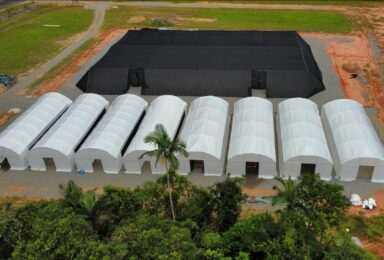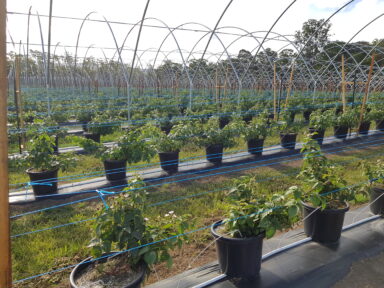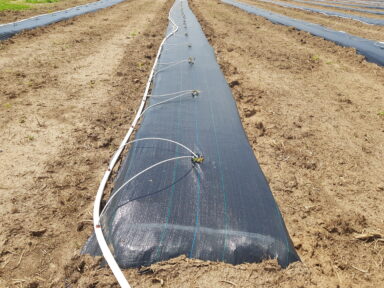What Is the Best Netting for Insects?
August 15, 2023
When trying to protect our gardens from pests, insects and other nuisance critters, it is important to choose the right type of netting.
There are several types of netting that can be used to help protect against insects or birds. The best type of netting for a particular situation will depend on the specific needs and requirements of the user.
In this post, we’ll look at the various types of insect netting and discuss which type is best suited for a given application. Let’s begin.
Is Insect Netting Effective?
The short answer is yes. Insect nets can help protect your garden from pests and insects, including aphids, mites, caterpillars, beetles, and other crawling critters.
Insect netting is made of a fine mesh that creates a physical barrier to keep out unwanted bugs. An insect-proof mesh or netting also creates an environment that discourages the reproduction of the insects and helps to reduce their population in your garden.
Here are some common benefits of insect netting:
- Helps to keep your garden free from pests and insects
- Prevents damage to crops and other plants
- Keeps beneficial insects in the garden, such as pollinators
- Reduces the need for insecticides or other chemical treatments
- Can be reused for multiple seasons
Types of Insect Netting
There are several types of insect netting available on the market, all designed to meet different needs and preferences. Here are some popular choices:
- Polypropylene Mesh – This mesh is strong and durable, making it a great option for long-term use. It is also UV-resistant, so it won’t fade or degrade in the sun.
- Polyethylene Mesh – This type of mesh is lightweight and flexible, making it easy to install and remove when necessary. It is also highly durable and can withstand harsh weather conditions.
- Aluminum Mesh – Aluminum netting provides excellent protection from insects but is also lightweight and easy to install.
- Plastic Mesh – This type of mesh is very affordable and provides a strong barrier against insects. It is also long-lasting and requires minimal maintenance.
What Is the Best Type of Netting for Insects?
The best type of netting for insects will depend on your particular needs and requirements. Consider the environment in which the netting will be used, as well as the types of insects you are trying to keep out of your garden.
For example, if you’re looking to protect your crops from large-scale pests like caterpillars or beetles, then a heavy-duty polypropylene mesh would be a great option. If you’re looking to protect your garden from smaller insects such as aphids, then a lightweight plastic mesh or aluminium mesh may be best.
Regardless of the netting you choose, it is important to ensure that the netting is well-secured and that all edges and corners are properly sealed off. This will help to ensure that no insects can get through the netting and into your garden.
Things to Consider When Choosing Insect Netting?
When selecting the right type of insect net, there are a few things to consider:
- Material: Consider the type of material that will best suit your needs. Polypropylene mesh is strong and durable, while plastic and aluminium are lightweight and flexible.
- Size: Make sure to measure the area you need to cover with netting before making a purchase.
- Weather Resistance: Depending on where you live, it may be necessary to select a netting material that is UV-resistant or waterproof.
- Installation: Choose a netting material that is easy to install and remove when necessary.
- Maintenance: Make sure to select a netting material that requires minimal maintenance and can be reused for multiple seasons.
Common Crops That Need Insect Netting
Insect netting can be used to protect a variety of crops, including fruits, vegetables, flowers, and herbs. Some common crops that benefit from insect and garden netting include:
- Grapes: Insect netting can help protect grapes from pests like moths and aphids.
- Apples: Insect netting can help to keep out apple maggots and other pests that can damage apples.
- Peaches: Insect netting is a great way to protect peaches from peach tree borers and other pesky insects.
- Cherries: Insect netting helps to protect cherries from cherry fruit fly and other bugs.
- Melons: Melons are often attacked by pests such as aphids, whiteflies, and squash bugs.
- Beans: Bean plants are prone to bacterial wilt, which can be prevented by using insect netting.
- Carrots: Carrots are susceptible to carrot rust flies and other pests that can be deterred by using insect netting.
- Blueberries: Blueberries are often attacked by thrips, mites, and other pests that can be kept out with insect netting.
- Squash: Squash is vulnerable to squash bugs and cucumber beetles, both of which can cause serious damage if left unchecked.
- Cucumbers: Cucumber beetles and striped cucumber beetles can chew through the foliage of cucumbers, leaving them vulnerable to disease.
- Tomatoes: Tomatoes are susceptible to a variety of pests, such as aphids and caterpillars. Insect netting can help to protect tomatoes from these pests and keep them safe from damage.
- Strawberries: Insects such as aphids, slugs, and mites can all harm strawberry plants. Insect netting is an effective way to protect these delicate fruits from pests.
- Herbs: Insect netting can help to protect herbs such as basil, parsley, sage, and thyme from aphids, caterpillars, and other common garden pests.
- Flowers: Flowering plants are often vulnerable to pest damage. Insect netting can be used to create a barrier that will keep out destructive insects while still allowing beneficial pollinators to access the flowers.
- Peppers: Insect netting can help to protect peppers from pests such as aphids, caterpillars, and beetles.
- Eggplant: Eggplant plants are particularly susceptible to damage from pests, so insect netting can help keep them safe.
Insect netting is an excellent way to protect your plants and crops from unwanted pests. By taking the time to select a suitable material and properly install the netting, you can enjoy a pest-free garden all season long.
Conclusion
Insect netting is an effective and affordable way to protect your garden from pests. With the right type of material and proper installation, you can enjoy a bug-free garden all season long.
Consider the environment in which the netting will be used, as well as the types of insects that you need to keep out, and then choose a material that best suits your needs.
At GreenLifeGRO, we offer several netting structures that can help protect your garden. Contact us today for more information or to get started on creating a pest-free environment for your garden!
Frequently Asked Questions – FAQs
How do you water plants under insect netting?
Watering plants under insect netting is easy and doesn’t require any special tools. All you need to do is loosen the netting where it meets the soil, then water the plants as normal. When finished, make sure to securely reattach the edges of the netting back to the soil. This will help ensure that no insects are able to get in while still allowing the plants to receive adequate water. You may also want to consider investing in a watering wand, which can help you direct the water exactly where it needs to go without having to move the netting about. This will save time and keep your plants healthy.
Do you need netting for vegetables?
Yes, netting is an essential tool for protecting vegetable crops from pests. Vegetables are particularly vulnerable to insect damage, so using a netting material will help reduce the risk of crop loss. Make sure to select a material that is suitable for your specific environment and pest problems, as well as one that can be easily installed and removed when necessary.
Is it better to choose a smaller mesh for insect protection?
Generally, a smaller mesh size is better for insect protection. This will help to keep out even the smallest pests, such as aphids and caterpillars. However, it is important to consider the material of the netting as well. Polypropylene mesh is strong yet lightweight, making it ideal for insect protection. Plastic and aluminium meshes may be lighter and more flexible, but they may not be as durable or effective. Make sure to carefully consider all your options before making a purchase.


